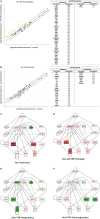Noncanonical NF-κB Signaling Upregulation in Inflammatory Bowel Disease Patients is Associated With Loss of Response to Anti-TNF Agents
- PMID: 34177575
- PMCID: PMC8223059
- DOI: 10.3389/fphar.2021.655887
Noncanonical NF-κB Signaling Upregulation in Inflammatory Bowel Disease Patients is Associated With Loss of Response to Anti-TNF Agents
Abstract
Objectives: Targeting tumor necrosis factor (TNF) with biologic agents, such as infliximab and adalimumab, is a widely used and effective therapeutic strategy in inflammatory bowel disease (IBD). Unfortunately, a significant number of patients fail to respond or lose response over time to these agents. Previous studies have defined multiple complex roles for canonical NF-κB signaling in the pathogenesis of IBD. However, preliminary evidence suggests that the lesser defined noncanonical NF-κB signaling pathway also contributes to disease pathogenesis and response to anti-TNF agents. The objective of this study was to evaluate this hypothesis in Crohn's disease (CD) and ulcerative colitis (UC) patients. Design: A total of 27 subjects with IBD (19 with CD and 8 with UC) and 15 control subjects were tested. Clinical criteria, patient history, and endoscopic disease activity were factors used to categorize patients and define therapeutic response. Biopsy specimens were collected during colonoscopy and expression was determined for 88 target genes known to be associated with noncanonical NF-κB signaling and IBD. Results: Noncanonical NF-κB signaling was significantly upregulated in IBD patients and was associated with increased gastrointestinal inflammation, epithelial cell death, lymphocyte migration, and Nod-like receptor signaling. Furthermore, noncanonical NF-κB signaling was further upregulated in patients unresponsive to anti-TNF agents and was suppressed in responsive patients. MAP3K14, NFKB2, CCL19, CXCL12, and CXCL13 were significantly dysregulated, as were genes that encode pathway regulators, such as CYLD, NLRP12, and BIRC2/3. Conclusion: Our study identifies a previously uncharacterized role for the understudied noncanonical NF-κB signaling pathway in the pathogenesis of IBD and anti-TNF therapy responsiveness. The genes and pathways identified may ultimately prove useful in IBD management and could potentially be used as biomarkers of drug response.
Keywords: Crohn’s disease; NIK; alternative pathway; anti-TNF agents; inflammatory bowel disease; noncanonical NF-κB pathway; therapeutic response; ulcerative colitis.
Copyright © 2021 Nguyen, Eden, Morrison, Sammons, Knight, Sorrentino, Brock, Grider, Allen and Sorrentino.
Conflict of interest statement
The authors declare that the research was conducted in the absence of any commercial or financial relationships that could be construed as a potential conflict of interest.
Figures



References
-
- Biancheri P., Brezski R. J., Di Sabatino A., Greenplate A. R., Soring K. L., Corazza G. R., et al. (2015). Proteolytic Cleavage and Loss of Function of Biologic Agents that Neutralize Tumor Necrosis Factor in the Mucosa of Patients with Inflammatory Bowel Disease. Gastroenterology 149, 1564–1574. 10.1053/j.gastro.2015.07.002 - DOI - PubMed
-
- Brandse J. F., Mathôt R. A., van der Kleij D., Rispens T., Ashruf Y., Jansen J. M., et al. (2016). Pharmacokinetic Features and Presence of Antidrug Antibodies Associate With Response to Infliximab Induction Therapy in Patients With Moderate to Severe Ulcerative Colitis. Clin. Gastroenterol. Hepatol. 14, 251–258. 10.1016/j.cgh.2015.10.029 - DOI - PubMed
LinkOut - more resources
Full Text Sources
Miscellaneous

